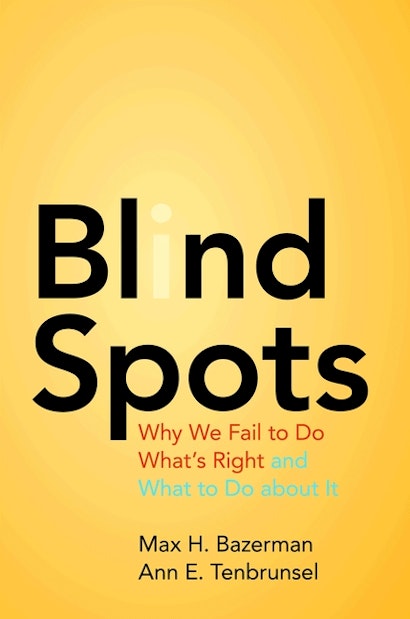When confronted with an ethical dilemma, most of us like to think we would stand up for our principles. But we are not as ethical as we think we are. In Blind Spots, leading business ethicists Max Bazerman and Ann Tenbrunsel examine the ways we overestimate our ability to do what is right and how we act unethically without meaning to. From the collapse of Enron and corruption in the tobacco industry, to sales of the defective Ford Pinto, the downfall of Bernard Madoff, and the Challenger space shuttle disaster, the authors investigate the nature of ethical failures in the business world and beyond, and illustrate how we can become more ethical, bridging the gap between who we are and who we want to be.
Explaining why traditional approaches to ethics don’t work, the book considers how blind spots like ethical fading—the removal of ethics from the decision—making process—have led to tragedies and scandals such as the Challenger space shuttle disaster, steroid use in Major League Baseball, the crash in the financial markets, and the energy crisis. The authors demonstrate how ethical standards shift, how we neglect to notice and act on the unethical behavior of others, and how compliance initiatives can actually promote unethical behavior. They argue that scandals will continue to emerge unless such approaches take into account the psychology of individuals faced with ethical dilemmas. Distinguishing our “should self” (the person who knows what is correct) from our “want self” (the person who ends up making decisions), the authors point out ethical sinkholes that create questionable actions.
Suggesting innovative individual and group tactics for improving human judgment, Blind Spots shows us how to secure a place for ethics in our workplaces, institutions, and daily lives.
Awards and Recognition
- Winner of the 2012 Silver Medal Book Award in Business Ethics, Axiom Business
"Well-written, stuffed with intriguing research, and more than a little unnerving, this book will make readers reconsider some of their most entrenched beliefs."—BizEd
"[Blind Spots] is full of studies in human behavior and those results can help us, and the people we manage, make better decisions. . . . [T]he book should be required reading for anyone entering the business world . . . or for those of us who still try to reconcile misdeeds that did not have to be."—Walter Pavlo, Forbes.com
"One explanation for what happened at News of the World can be found in a new book called Blind Spots. Its authors Max Bazerman and Ann Tenbrunsel look at how businesses, from Ford to Enron to subprime mortgage lenders, can end up mired in ethical disaster. But rather than discuss such choices as coolly calculated trade-offs between right and wrong, they look at how people actually make decisions—under pressure from shareholders, bosses and colleagues, up against tight deadlines and often worried about their careers, or even whether their contracts are going to be renewed."—Aditya Chakrabortty, Guardian
"This book is a step toward . . . bringing together a host of studies by the authors and others that probe how easy it is for us [to] act less ethically than we would like. The book also shows how organizations can take advantage of these findings in behavioural ethics to change their informal culture."—Harvey Schachter, The Globe & Mail
"Bazerman and Tenbrunsel apply insights from the field of behavioral ethics to understand why individuals and organizations act unethically and what can be done to prevent such behavior. They draw on research from psychology and business to illustrate how factors outside our awareness influence decisions and behavior, and what we can do to prevent ethical lapses."—Taya R. Cohen, Pittsburgh Business Times
"Blind Spots is a bold argument against the decency of human beings, showing how we subvert our ethical principles time and time again. Noting a human tendency to justify our own actions to ourselves with little thought for their consequences, business professors Max Bazerman and Ann Tenbrunsel explain how employees can give rise to dysfunctional organizations for fear of rocking the boat. . . . The authors adopt a lively tone throughout and harness a broad mix of examples, from lab experiments to the Challenger Space Shuttle disaster and the collapse of Enron."—Gregor Hunter, The National
"In an era where we've watched political leaders tell blatant lies and seen the corporate world nearly sunk by an onslaught of questionable ethics, it's time to take a sober look at why people who think of themselves as moral can commit unethical and even unlawful acts—or approve the dishonest acts of others. . . . [T]his is examined in the recent book Blind Spots, by Harvard Business School professor Max Bazerman and Ann Tenbrunsel, professor of business ethics at the University of Notre Dame."—Toronto Star
"The style [of Blind Spots] is incisive and reassuringly uningratiating."—Steven Poole, The Guardian
"Bazerman . . . and . . . Tenbrunsel . . . set out to show that if we are to make ethical decisions, we need to recognize such blind spots in ourselves as our failure to view our own immoral actions objectively and our tendency to act based on how we want to behave rather than on how we should."—Susan Schwartz, Montreal Gazette
"Blind Spots is a good book. It tells a story in a clear and compelling fashion, which is what a book is for. The story is that we often act unethically, not because we're faced with ethical questions and decide to pick the 'bad' option, but because we fail to see that there is an ethical issue at all."—Neuroskeptic blog
"If you want to be an ethical person or organization and are sometimes left nonplussed by the unethical behavior that still ensues nonetheless, then this is the right book to help you understand and correctly ensure that ethical behavior happens when push comes to shove."—Mouse Trap blog
"Are we as ethical as we think we are? An important new book by . . . Max Bazerman and . . . Ann Tenbrunsel says probably not. In Blind Spots: Why We Fail to Do What's Right and What to Do about It, Bazerman and Tenbrunsel make a convincing case that a significant gap exists between how ethical we think we are and how ethical we actually are."—Scott Flegal, Nashua Telegraph
"In their well-written, easily accessible text, Bazerman and Tenbrunsel rely on well-known cases of ethical failure and prior research, often previously popularized psychological studies, to frame the emerging field of behavioral ethics. . . . [I]t serves as an excellent introduction to the discipline."—Choice
"I enjoyed this book and think it is ideal for a team of managers to read together. Knowing how common it is for individuals to miss seeing a conflict or bias, colleagues could commit to challenging each other with candor and care."—Jill Geisler, Poynter
"I will surely consider using the text in the classroom in the future. . . . [P]articularly if one is trying to establish organizational policy that encourages ethical behavior—there is a good deal here that will be of interest."—J. Jeremy Wisnewski, Philosophy in Review
"This fascinating book holds up a desperately needed mirror that objectively reveals a reflection we might not want to see. Yet through experienced guidance and genuine input, Bazerman and Tenbrunsel offer solutions that can powerfully change the way we do business."—Stephen R. Covey, author of The 7 Habits of Highly Effective People and The Leader in Me
"When we think of unethical behavior, the images that often come to mind are those of robbers, thieves, the executives at Enron, or Bernie Madoff. Blind Spots is not just about these criminals, but about a much larger problem-the dishonest actions that we all take while still thinking of ourselves as wonderfully moral people. In this important book, Bazerman and Tenbrunsel show us how we fail to see our own immoral actions in an objective light, and the trouble that this biased view gets us into."—Dan Ariely, author of Predictably Irrational
"Peppered with compelling examples, Bazerman and Tenbrunsel's lively book deserves the broadest possible audience. Showing that the human mind sometimes leads us to behave in ways that are inconsistent with our own ethical standards, Blind Spots introduces behavioral ethics and reveals how this emerging field has important implications for wise decision making in our personal and professional lives. This is a must-read for those responsible for shaping regulatory policies in organizations and government."—Robert H. Mnookin, Harvard University
"Bazerman and Tenbrunsel weave together solid scientific evidence, stories from the press, and reports from their own experiences to convincingly demonstrate that the actions of people and organizations often do not live up to their stated ethical standards. Addressing, in insightful ways, how this gap might be closed, this important book is a must-read for business leaders, government officials, and students of behavioral ethics."—Arthur P. Brief, University of Utah
"This terrific book summarizes the rapid advances made in the field of behavioral ethics and brings them to the attention of the thoughtful practitioner. With good examples and lucid writing, this book makes a reliable reference for people interested in building ethical organizations and institutions."—Madan Pillutla, London Business School


